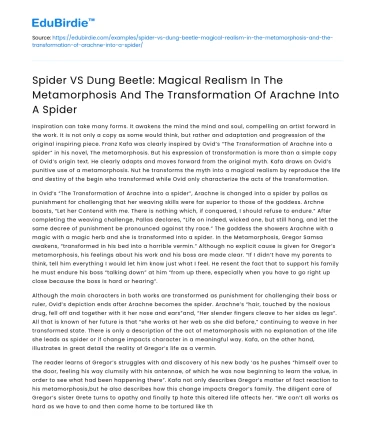Inspiration can take many forms. It awakens the mind the mind and soul, compelling an artist forward in the work. It is not only a copy as some would think, but rather and adaptation and progression of the original inspiring piece. Franz Kafa was clearly inspired by Ovid’s “The Transformation of Arachne into a spider” in his novel, The metamorphosis. But his expression of transformation is more than a simple copy of Ovid’s origin text. He clearly adapts and moves forward from the original myth. Kafa draws on Ovid’s punitive use of a metamorphosis. Nut he transforms the myth into a magical realism by reproduce the life and destiny of the begin who transformed while Ovid only characterize the acts of the transformation.
In Ovid’s “The Transformation of Arachne into a spider”, Arachne is changed into a spider by pallas as punishment for challenging that her weaving skills were far superior to those of the goddess. Archne boasts, “Let her Contend with me. There is nothing which, if conquered, I should refuse to endure.” After completing the weaving challenge, Pallas declares, “Life on indeed, wicked one, but still hang, and let the same decree of punishment be pronounced against thy race.” The goddess the showers Arachne with a magic with a magic herb and she is transformed into a spider. In the Metamorphosis, Gregor Samsa awakens, “transformed in his bed into a horrible vermin.” Although no explicit cause is given for Gregor’s metamorphosis, his feelings about his work and his boss are made clear. “If I didn’t have my parents to think, tell him everything I would let him know just what I feel. He resent the fact that to support his family he must endure his boss “talking down” at him “from up there, especially when you have to go right up close because the boss is hard or hearing”.
Although the main characters in both works are transformed as punishment for challenging their boss or ruler, Ovid’s depiction ends after Arachne becomes the spider. Arachne’s “hair, touched by the noxious drug, fell off and together with it her nose and ears”and, “Her slender fingers cleave to her sides as legs”. All that is known of her future is that “she works at her web as she did before,” continuing to weave in her transformed state. There is only a description of the act of metamorphosis with no explanation of the life she leads as spider or if change impacts character in a meaningful way. Kafa, on the other hand, illustrates in great detail the reality of Gregor’s life as a vermin.
The reader learns of Gregor’s struggles with and discovery of his new body ‘as he pushes “himself over to the door, feeling his way clumsily with his antennae, of which he was now beginning to learn the value, in order to see what had been happening there”. Kafa not only describes Gregor’s matter of fact reaction to his metamorphosis,but he also describes how this change impacts Gregor’s family. The diligent care of Gregor’s sister Grete turns to apathy and finally tp hate this altered life affects her. “We can’t all works as hard as we have to and then come home to be tortured like this, we can’t endure it. I can’t endure it any more” she finally confesses to her parent.
Kafa’s The Metamorphosis meets the criteria of magical realism because he draws on transforms Ovid’s “The Transformation of Arachne into a Spider”. He is inspired by Ovid’s use of a putative transformation, but Kafa moves his work beyond that act to realistically depict the life and struggles of living with this magical metamorphosis. It is this pragmatic, rational depiction of the irrational that makes it a classic example of magical realism.






 Stuck on your essay?
Stuck on your essay?

